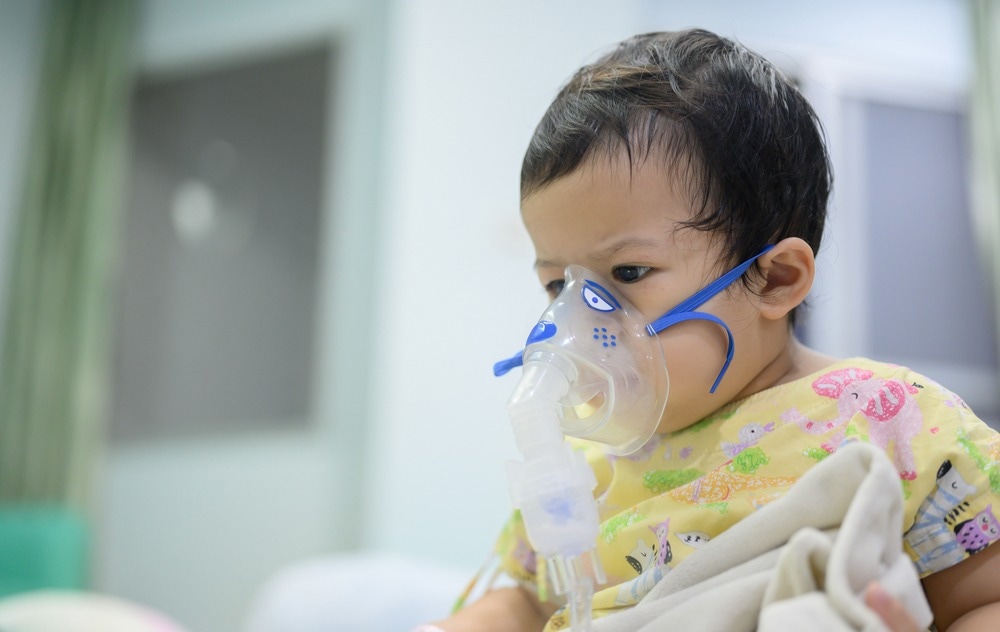Infection with the respiratory syncytial virus (RSV) is the most common cause of respiratory illness among both infants and young children throughout the world, as well as the most common cause of infant hospitalizations in the United States. Although RSV cases typically peak between December and February, RSV hospitalizations are reaching similarly high levels much earlier than normal this year.

Image Credit: Theera Disayarat / Shutterstock.com
Rising RSV cases
RSV is an extremely common respiratory virus that typically causes mild cold-like symptoms in affected individuals. Some of these symptoms may include a runny nose, reduced appetite, cough, irritability, reduced activity, and apnea.
Despite this, RSV can be extremely dangerous for some infants and young children, with up to 80,000 children younger than five years of age hospitalized each year in the U.S. due to RSV. Many of these severe cases are categorized by the development of bronchiolitis and pneumonia.
The U.S. Centers for Disease Control and Prevention (CDC) RSV Hospitalization Surveillance Network (RSV-NET) is an interactive dashboard that provides information on laboratory-confirmed RSV-associated hospitalizations in children younger than 18 years of age and adults.
In all eight of the 10 regions monitored through RSV-NET, a significant rise in RSV laboratory tests has been reported over the past few months. In fact, many pediatric intensive care units (ICUs) throughout the U.S. are at or exceeding capacity due to the increasing number of children who are being admitted due to severe RSV and other illnesses.
At Massachusetts General Hospital, for example, over 2,000 RSV cases were seen throughout October, which was soon followed by over 1,000 RSV cases reported at this hospital alone in November. Similarly high case numbers have been reported throughout the U.S.
Although the current rise in RSV cases has been severe and continues to strain healthcare systems, the U.S. CDC has indicated that current RSV cases do not appear to be any more severe than those that have been reported in previous years.
Treatment and prevention
As compared to the coronavirus disease 2019 (COVID-19), which is still relatively novel despite its persistence for over two years now, healthcare professionals have been treating severe RSV illnesses for several decades. Although there are no specific antiviral agents that can target RSV, some of the primary approaches that can be used to relieve symptoms include fever and pain management and remaining hydrated.
Although there is no vaccine currently available to prevent RSV, a recent Pfizer press release suggests that their maternal RSV vaccine is extremely effective in preventing serious illness in the infants born to immunized mothers for up to the first six months of life. Additional advancements have been made in the development of monoclonal antibodies like palivizumab that could be used to prevent severe illness in high-risk patients, such as premature infants born before their mothers were able to receive a maternal RSV vaccine.
Aside from possible treatment options, there are also several ways in which the spread of RSV can be prevented. These include covering your hands when coughing and sneezing, washing your hands frequently with both soap and water for at least 20 seconds, as well as avoiding close contact with others, particularly those who are symptomatic.
Sources:
- Wildenbeest, J. G., Bilard, M., Zuurbier, R. P., et al. (2022). The burden of respiratory syncytial virus in healthy term-born infants in Europe: a prospective birth cohort study. The Lancet Respiratory Medicine. doi:10.1016/S2213-2600(22)00414-3.
- McLaughlin, J. M., Khan, F., Schmitt, H., et al. (2020). Respiratory Syncytial Virus – Associated Hospitalizations in US Infants: A Systemic Review and Meta-Analysis. The Journal of Infectious Diseases. doi:10.1093/infdis/jiaa752.
- “Infants and Young Children” [Online]. Available from: https://www.cdc.gov/rsv/high-risk/infants-young-children.html.